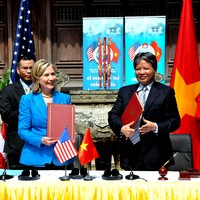Relations between the United States and Vietnam have progressed rapidly and comprehensively since the normalization of ties in 1995. In just the past few years, the two countries have inked agreements in areas including environmental protection, nuclear energy and health research cooperation. They have also deepened their robust economic relationship, with Vietnam signing on to the U.S.-led Trans-Pacific Partnership (TPP) negotiations, and have declared their common interest in freedom of navigation in the South China Sea. Yet if the U.S. and Vietnam wish to take their emerging strategic partnership to the next level, as officials from both sides have indicated, they will need to get past several challenges.
For the United States, the challenge will be sustaining and balancing its engagement with Vietnam and Asia more generally. Vietnam has welcomed the great strides made in relations between the U.S. and the Association of Southeast Asian Nations (ASEAN) under the Obama administration, including developments such as the Lower Mekong Initiative and American attendance at the East Asia Summit last year. However, Hanoi worries about the sustainability of the U.S. presence. This is a particular concern this year as the Obama White House moves fully into election mode. The management of noncrisis foreign policy issues may drop off the priority list, while foreign travel may be limited and new and existing agreements shelved. The potential departure of key Asia-focused members of President Barack Obama's foreign policy team, like Secretary of State Hillary Clinton, would only exacerbate this sense of drift, with potentially profound consequences for the regional security environment.
How the United States manages its relationship with China will also have a significant impact on U.S.-Vietnam ties. Since Southeast Asian states value the flexibility that comes from maintaining relationships with a range of big powers simultaneously, they are naturally sensitive to tensions between those powers. This is particularly the case for Vietnam, whose geographical proximity to and complex history with China means that Hanoi must walk a tightrope between Beijing and Washington.

